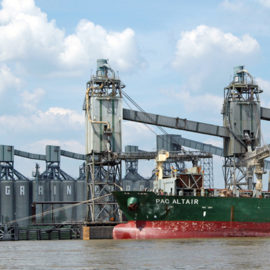
The leak has been fixed and they students had an early out.
An early morning ammonia leak at the CF Industries complex in western Ascension Parish forced the closure of a public elementary school and shut down two local highways headed into the city of Donaldsonville for more than five hours Thursday, authorities said. The leak was reported about 6:30 a.m. when a flange failed on an ammonia storage tank in a loading area for the complex just outside of Donaldsonville, company and state officials said. Students and staff of Donaldsonville Primary School had class at another public school inside Donaldsonville a few miles southwest of the plant to avoid the early morning leak, school officials said. A school of about 460 young children, Donaldsonville Primary is located along La. 3089 and is within sight of the CF Industries, the largest fertilizer complex in North America. The Mississippi River plant, which is separated from the school by a cane field, creates ammonia and uses it as a central element in its production process to create agricultural fertilizers.
nola.com
This is a common drill for the students.
Located in Louisiana’s chemical corridor, Ascension schools like those in Donaldsonville and Dutchtown usually shelter in place under standard school policy whenever a leak or other threat from a plant malfunction occurs. But Jackie Tisdell, public school spokeswoman, said most students at Donaldsonville Primary hadn’t arrived when the morning leak was reported. “Because kids hadn’t arrived yet, we were able to redirect them,” she said. Buses on the road went directly to Lowery Elementary/Middle School off La. 1. A few buses had arrived at Donaldsonville Primary but didn’t unload their children, instead leaving for the other school, Tisdell added. Some staff who were on campus at Donaldsonville Primary did evacuate. Other community areas farther from the plant, including a busy commercial area on La. 3089 and one of Donaldsonville’s oldest neighborhoods, were not ordered to shelter in place, local officials said.
HAZMAT teams were on scene with other units.
The leak prompted hazardous materials teams from the Ascension Parish Sheriff’s Office and officials from handful of other agencies to respond, along with CF Industries internal response workers. Crews were able to control the leak and halt it by shortly before mid-day Thursday. “Our primary focus is always on the safety of our employees, our neighbors and the environment,” said Morris Johnson, general manager of the Donaldsonville plant. “CF Industries will continue to work with local officials to provide any additional updates on the incident as warranted.” No injuries were reported, CF officials said.
Water sprayed on the leak helped.
Before emergency workers got the leak under control, they sprayed water on the faulty flange to prevent the ammonia gas from continuing to spread. The gas, which is generally lighter than air, is soluble in water. Once it is hit with the water spray, it is washed onto the ground, said Greg Langley, the state Department of Environmental Quality’s spokesman. Langley couldn’t say how much ammonia was in the storage tank before the leak began. Within seven days, CF Industries will be required to submit to DEQ estimates of how much ammonia leaked. Some time later, those reports become public in an online agency database.
Ammonia is natural but not in the concentrations found in processing.
Though a chemical found naturally in the environment, including in soil, ammonia is also a common industrial element. At significantly high concentrations, it can be caustic gas that will irritate and even seriously damage the eyes, nose, throat and lungs. Due to young children’s smaller body size relative to their lung capacity, they can receive larger inhalation doses of ammonia than adults would. DEQ responders did initially detect low levels of ammonia at the plant’s fence line, Langley said. The was a possible indication that some ammonia may be getting off site, at least initially. But Langley said even those early readings weren’t high enough to represent a threat to the public. Langley didn’t immediately have precise figures for the air readings, however. CF Industries and sheriff’s officials added that company readings at the primary school and in the community away from the plant did not detect ammonia. Then, by 11:40 a.m., the leak “had been isolated and secured,” DEQ officials added. “Air monitoring outside the facility was non-detect,” Langley added after the leak was secured.
Roads were quickly reopened.
Shortly afterward, Ascension Parish Sheriff Bobby Webre announced that River Road and La. 3089 had been reopened after being closed for several hours. The closures, which did not directly affect traffic on La. 70 or the Sunshine Bridge, did force drivers headed to Donaldsonville from La. 70 on a long detour through Paincourtville and La. 308 in Assumption Parish. Donaldsonville Primary students at Lowery were released 1 p.m. Thursday following lunch, Tisdell said. She said the decision for an early release happened for logistical reasons – no lunch was available at Donaldsonville Primary after the evacuation and school buses would need to start early Thursday afternoon to handle the extra kids.
This is a big plant, the largest in the world.
The CF Industries plant, on average, produces 4.34 million tons of ammonia per year, which the company says makes it the largest in the world for ammonia production. CF Industries creates the ammonia by synthesizing hydrogen pulled from natural gas and nitrogen from the air. The ammonia is used to create the agricultural fertilizer products nitric acid, urea and urea ammonium nitrate, the company says.
Another typical day along the Mississippi.


